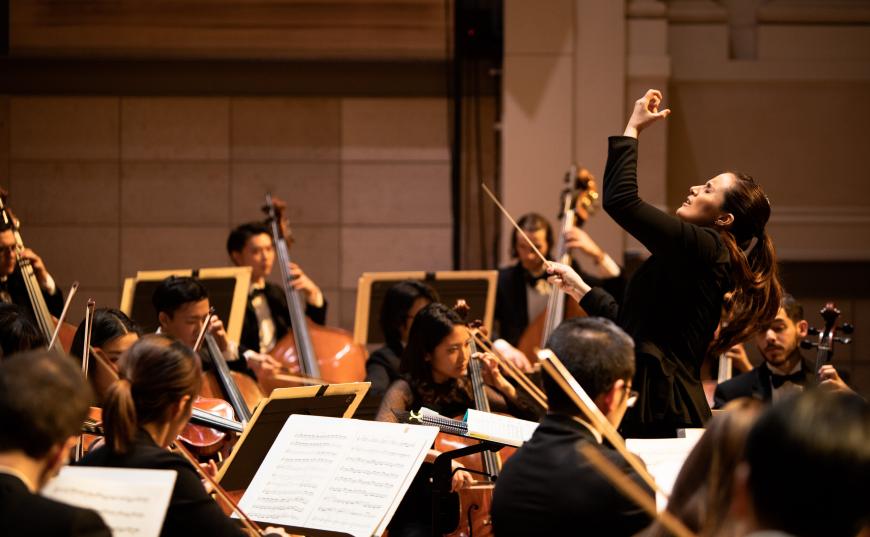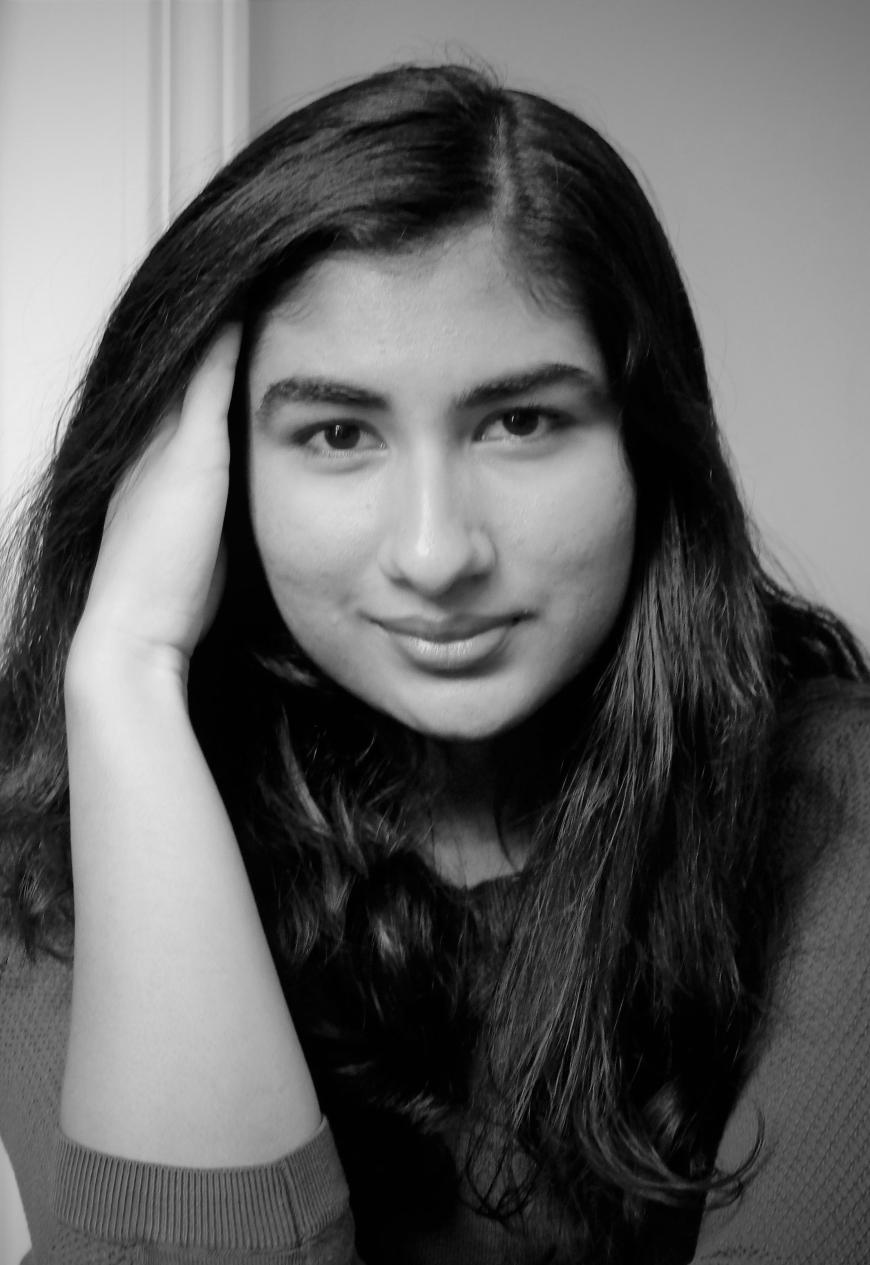
Growing up in Cali, Colombia, Lina González-Granados was encouraged to study piano so as to stay off the streets because of civil unrest. This proved to be an auspicious choice, as the musician, who ultimately became captivated with leading orchestras and not performing with them, went on to earn graduate degrees in conducting from New England Conservatory and a doctorate from Boston University.
Indeed, the 36-year-old maestra, who makes her debut with the Los Angeles Philharmonic at the Hollywood Bowl on Aug. 11, has also racked up fistfuls of honors and rave reviews. OperaWire praised her “attention to orchestral colors,” while The Boston Musical Intelligencer commended her ability to create “lightning changes in tempo, meter, and effect.” In addition, González-Granados was the winner of the 2019 Chicago Symphony Orchestra Sir Georg Solti International Conducting Competition; previous appointments include conducting fellowships at both The Philadelphia Orchestra and Seattle Symphony.

Recently, she has appeared with the Orquesta Sinfónica Nacional de Colombia, Filarmónica de Medellin, and Tulsa Opera, where she was the first Latina conductor to lead a major production in a U.S. opera house, her website says. González-Granados has also served as assistant conductor for the Chicago Symphony at the Ravinia Festival, London Philharmonic Orchestra, and Carnegie Hall’s National Youth Orchestra of the United States.
González-Granados founded the Boston-based Unitas Ensemble in 2014, and the group has since commissioned and performed some dozen world, North American, and U.S. premieres. Adding icing to her musical cake, on Sept. 17, González-Granados begins a three-year appointment as resident conductor of Los Angeles Opera, when she leads the orchestra in six performances of the company’s Simon Stone-directed production of Lucia di Lammermoor.
I recently called González-Granados at her home base in Philadelphia. In her charmingly accented English, she opened up on a broad range of topics, including programming, mentors, and her attraction to new music.
I understand that you fell in love with music at age 5, when your grandfather played a recording of Beethoven’s Fifth Symphony for you.
It was an overwhelming experience. I can tell you — and this was a long time ago, more than 30 years — but I remember being absolutely enamored by the music. It became an obsession, and when you’re little, obsessions become great passions. He also had Mozart’s Symphony No. 40 in his studio, and I started listening and memorizing it.
When he saw this, he bought me a little piano, and I started getting all the harmonies and melodies. My parents and family don’t have a musical background — my mom and dad are doctors — but they saw it. They thought maybe something could be there.
Would you say, then, that music chose you or you chose music?
I think music chose me, but in a lot of ways I think it would be both. Call it luck, serendipity, but I started going to activities involving music. I used to go outdoors for horses and sports, but they weren’t my thing. I also did poetry and writing, that was good, but music was the one I really locked into, so maybe it was more the inspiration, that music captured me.

Let’s talk about your upcoming concert at the Bowl. How do you decide on the program of Nina Shekhar’s Lumina, the Paganini’s Sonata per la Grand Viola (with principal violist Teng Li), and Rimsky-Korsakov’s Scheherazade?
How do I program? The program is as diverse as my thoughts. It’s always a conversation of what the vision of the season is and what I can bring to the table. This one — bringing a big piece like Scheherazade — I have said, “How can it be relatable to today’s America — and at the quintessential Bowl? How can we bring it home to a piece that is universal?” I try to think about those things.
Nina has [had] a meteoric rise of her career, and I’ve known her for three years. I saw her rise. We know each other on a closer level now, and I always championed her music. She’s a [first-generation] Indian American composer, and she’s as strong as Scheherazade, which is harrowing in my mind. In that sense, Nina is the same. She’s breaking every barrier.
Her piece is a slow piece that talks about light and the world of light in different parts of the orchestra. Then the light explodes. It’s energetic in a literal way and is a good way to open the conversation. It transmits light, and that’s how I feel about the Bowl. It’s outdoors and full of energy that exudes everywhere — from the shell [to] the number of people.
[With the] viola sonata, it’s all women telling a story with strength. I think the common thread is how we are all strong women telling a story, and that’s how I thought about it. How does it relate to today’s America — how can I tell this story [through] these very contrasting pieces.
Speaking of strength, you’ve had some very powerful mentors, including Riccardo Muti, Yannick Nézet-Séguin, and Bramwell Tovey, who, sadly, passed away recently.

[Tovey] was my principal mentor at Boston University. I studied with him for three years, and after that, I kept in touch regularly with him. I went to conduct in Rhode Island, and he was there in February 2022. For me, it’s been devastating, and that was the last time I saw him. The most beautiful teachings I got from him [were] how to treat people, how to open doors for people. He used to be my biggest champion. If I told him I would conduct somewhere, he would say, “Oh, I have a friend there.” He always had someone to call for me.
He believed in my abilities, and that’s so necessary. He was a genius, and there are few like him. He could accompany, arrange, play the piano. He was like a great force for me. Besides him, my two latest: One is Riccardo Muti, whom I have been assisting. He is such a disciplined human, and everything goes to the music. He’s so rigorous with his preparation. He puts everyone to shame at that age [81] that he is, especially with new pieces. But even if it’s a string quartet, I see his profoundness. It’s very humbling and beautiful to see something like that, plus all the experience he brings.
I also think Yannick comes to a very different point of view, compared to Muti. But both come from the same core place — their love for musicians, their absolute commitment to music. Just like [their] kindness; they all are so kind. The three of them, I say they are my principal mentors because they are such strong characters, yet they show honest and profound ability at the podium, all backed up with vulnerability. It’s a combination of that, and you think everybody should have it, but it’s not as common. To have their preparation, their people skills, their commitment — I aspire to this very greatly, and I hope I can fill their shoes.
Why is championing and conducting new music important to you?
It’s important to know what’s happening in the world and how artists are reacting. What I love about conducting new music is the ability to have live conversations with composers, the bouncing off of ideas with the score. It’s so easy when someone is telling you what they want. It’s a fascinating process, and I love talking to composers.
Conducting in itself is a lonely profession, so whenever I have the opportunity [to work on a new piece], I will take it in a heartbeat. For us as American conductors — and I’m Colombian American, I’ve been an American citizen for almost three years — it’s my moral duty as well to give people the opportunity to say, “That’s how America looks.”
I always had an affinity for American composers and music, and there is an artistic duty to expand the voices for the community. New music expanded my repertory, but it also made my life richer to see how those connections were made. My identity as Latina and how to get all of these connections in my brain and my soul has been one fascinating journey for me personally.

How excited are you to be LA Opera’s newest resident conductor — leading the orchestra in the season opener Lucia de Lammermoor — and how did the appointment come about?
Yes, this is my debut with the opera company, and what life and opportunity has presented to me — I’ve been ready for the longest time, and then they show up. I have to take the opportunity. This is the case: They had been looking at different candidates for a period of time when they saw me one day, and they expressed they wanted to meet with me. They called and invited me for this appointment, and after that, my interest piqued very much because of the nature of the city and the background of LA Opera.
Most importantly, when we met and our core values aligned — the way I think about communities and that our artistic endeavors should serve the community — this conversation cemented the relationship. It’s important for the Latino population and is a way to arrive to a community I already belong to and to serve them as well. The Latino community loves opera, and LA Opera has [community groups like] Hispanics for LA Opera.
Sharing that love is very nurturing and important and refreshing. [The appointment] means the world to me. It’s been a long time coming — I’ve always been enamored with opera — and I wanted an opportunity to present itself to pursue those tastes and those commitments. It wasn’t something I was pursuing actively but was pleasantly surprised about.
What advice would you give aspiring conductors?
The only advice I can give is [what] I give to myself — or my parents used to give me: I can’t be following somebody else’s path, like a shadow. The only way for me to work is walk my path, with my head up, proud of who I am, and to be grateful for my mentors. But I need to walk my own path and dream of what that could mean.
Don’t compare yourself and try to replicate a career because it won’t happen like that. And be patient, resilient. It takes a lot of patience to be in this profession and do it and get up and do it again. And get up the next day and do it again, no matter the outcome.




